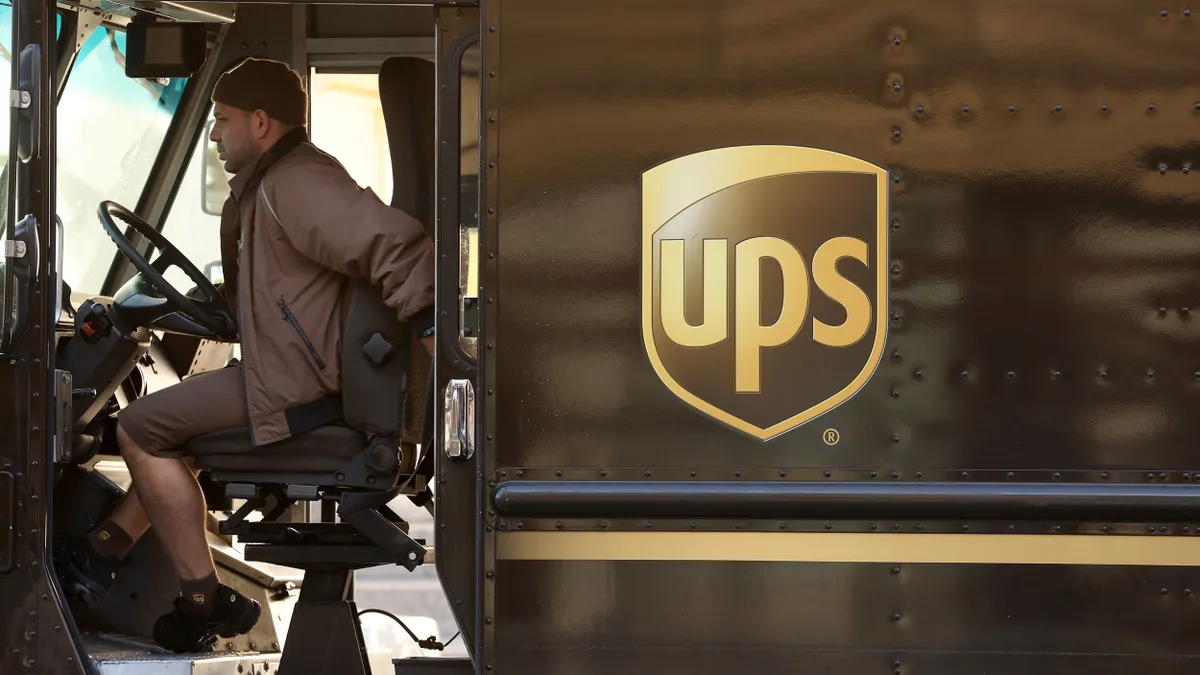Dive Brief:
- The United Parcel Service will pay a $45 million penalty in association with settled charges from the Securities and Exchange Commission for materially misrepresenting its earnings, relating to the improper valuation of a business unit, according to a Friday press release.
- The Atlanta, Georgia based company failed to record goodwill impairment for its UPS Freight unit in 2019, a failure which led the company to overvalue the unit — which offered “less-than-truckload” services — and mislead investors prior to its sale, the SEC’s order found. UPS sold its Freight business to its rival TFI International in 2021 for $800 million, according to a company press release at the time.
- While a 2019 analysis by the company found the unit was likely to sell for between $350 million to $650 million, when conducting the impairment test required under Generally Accepted Accounting Principles, UPS ignored its own assessment, the SEC said. Rather, UPS relied upon valuations provided by an external consultant, “without giving the consultant the information it needed to fairly value the business, according to the order. “Using financial information and assumptions provided or approved by UPS, the consultant valued Freight at about $2 billion,” the SEC said.
Dive Insight:
UPS failed to provide key information to the external consultant, such as the fact that the company’s internal analysis “had concluded a prospective buyer would expect Freight to generate significantly less profit after it was sold because it would no longer benefit from synergies and other cost savings it was getting as part of UPS,” the SEC said in its order.
UPS’s own analysis valued the freight unit at $1.4 billion, with the analysis indicating almost $500 million of goodwill associated with UPS Freight was impaired, the SEC said.
“It was clear that the consultant’s valuation was based on assumptions a prospective buyer would not make in valuing Freight, and therefore did not produce a fair value estimate determined in accordance with GAAP,” the order reads. “Nevertheless, UPS relied on this valuation and did not record a goodwill impairment.”
Goodwill balances grant investors “valuable insight into whether companies are successfully operating the businesses they own,” Melissa Hodgman, associate director of the division of enforcement said in a statement. “Therefore, it is essential for companies to prepare reliable fair value estimates and impair goodwill when required. UPS fell short of these obligations, repeatedly ignoring its own well-founded sale price estimates for Freight in favor of unreliable third-party valuations.”
UPS did not admit or deny the SEC’s charges as part of the settlement, a company spokesperson told CFO Dive in an email, noting that the company previously disclosed the investigation, which concerned company practices “surrounding impairment analyses in connection with the divestiture of UPS Freight in April 2021,” the spokesperson said. That analysis led to a non-cash goodwill impairment charge recorded for the quarter ended Dec. 31, 2020, the spokesperson said.
“The settlement amount had previously been fully accrued in our financial statements, and the settlement will not have a material effect on our business, financial condition, results of operation, or liquidity,” the spokesperson said.
The 2021 sale of UPS Freight represented a critical strategic shift for the business at the time, with the company moving away from trucking and focusing in on its parcel delivery business, the Wall Street Journal reported at the time. The move came just several months after UPS CEO Carol Tomé first assumed the top seat in June 2020, and epitomized her “better, not bigger” business strategy, the WSJ said.
The company has continued to narrow its focus to its core parcel business in recent months; in June, UPS announced its intent to sell its Coyote Logistics business to fellow logistics shipping firm RXO Inc. The moves come as UPS is looking to boost shipping volumes and revenues while balancing greater costs of labor, a key balancing act for CFO Brian Dykes. A 15-year company veteran, Dykes took the CFO seat in July, CFO Dive previously reported.
For its most recent quarter ended Sept. 30, UPS reported revenues of $22.2 billion, a 5.6% increase year-over-year, according to its earnings release. Operating profit for the quarter jumped nearly 48% year-over-year to reach $2 billion, the company said.












